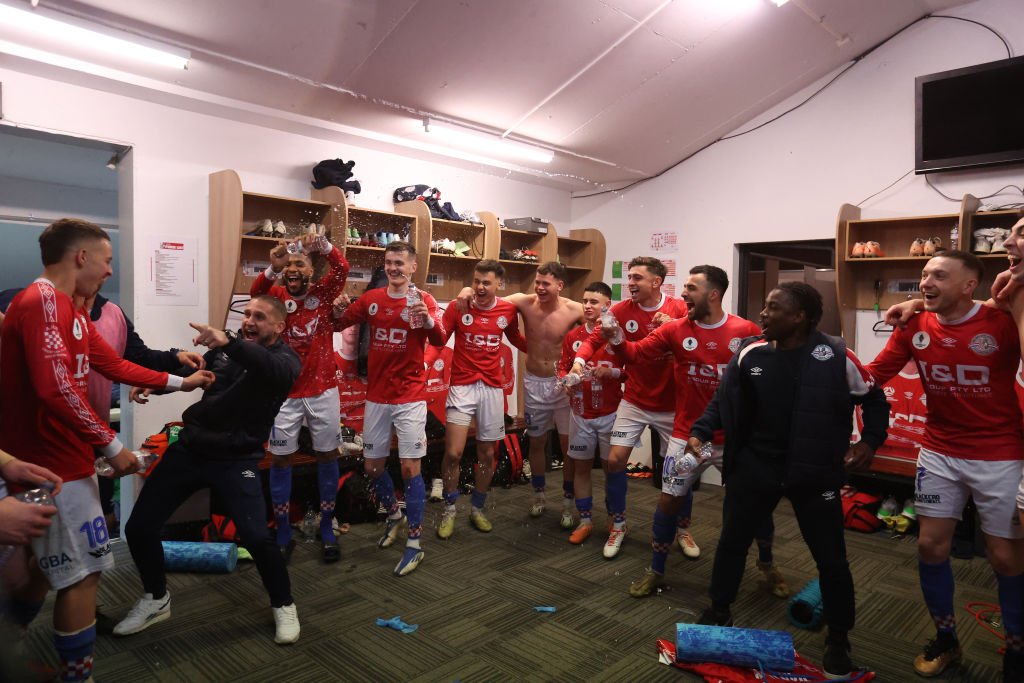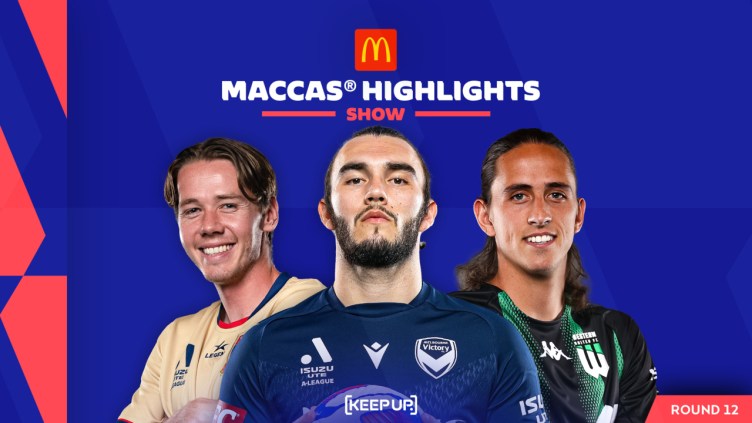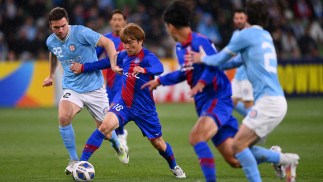Ahead of Melbourne Knights’ blockbuster 2023 Australia Cup semi-final against Brisbane Roar, KEEPUP charts the club’s storied 70 year history.
On Sunday evening, one of Australia’s most storied clubs will play in arguably its biggest match in almost 30 years.
Melbourne Knights welcome Brisbane Roar to town, where the winner will earn a place in the final of the 2023 Australia Cup. The Victorian powerhouse has been reinvigorated under new coach Ben Cahn, who has taken the club back to the NPL Victoria finals for the first time in eight years along with their deepest Cup run yet.
BUY TICKETS TO MELBOURNE KNIGHTS V BRISBANE ROAR
Now, they have the chance to become only the second member federation club to ever compete in an Australia Cup final, after Sydney United 58 did so last year.
But playing in these high-stakes contests is nothing new for Knights, who have a history of competing among the best sides in Australia over their 70-year existence.
Ahead of Sunday’s contest, KEEPUP charts their journey from all the way back in 1953 to now.
READ MORE ON KEEPUP
ULTIMATE GUIDE: Everything you need to know for Australia Cup SFs
CAHN: Unique rise of Australia’s brightest young coach who has awoken a sleeping giant
Roots of the club
Melbourne Knights’ journey started all the way back in April 1953.
A small group of Croatian migrants decided to register themselves as a football club with what was then the Victoria Soccer Federation, legitimising their occasional social game.
With the little resourcing they had, the club’s founding fathers went on a recruiting spree across the state, travelling as far Bonegilla – which is three-and-a half-hours away from Melbourne’s CBD – to interview potential players at the town’s immigrant camp on multiple occasions.
A number of players were acquired and away they went. On April 9, 1953, a church service was held to bless the new team, before they played their first game as a football club called SC Croatia the following day.
The club wouldn’t play its first official game until the following year in the Victorian Provisional League.
BUY TICKETS TO MELBOURNE KNIGHTS V BRISBANE ROAR

Croatia found its feet in the years that followed and continued to scout far and wide to bring players in, especially when migrant ships docked at Station Pier, where immigrants were met by the club’s scouts, players and officials.
“A simple tap on the shoulder followed by two questions, “Where are you from?”, and “Can you play football?”, was all it took,” says in an excerpt on the club’s history page.
“You either became a potential player or a new supporter, and the next thing you knew, your family, yourself, and all your belongings were being shoved into the back of a car and driven to one of the many new half-way supporters homes set up in Footscray.”
In the years that followed, the club slowly started to rise up the Victorian football pyramid, winning their first piece of silverware in 1959 after they were crowned Division 1 champions.
However, the club were stripped of the championship after a successful appeal by second placed Preston Makedonia to overturn a result earlier in the season, which in turn handed them the title.
Since Preston weren’t prepared for a move to the top-flight, they reached out to then SC Croatia secretary, and maternal grandfather of John Didulica, Joe Radojevic about merging the two clubs.
Despite the committee voting against a merger, Radojevic had already arranged the merger with the federation, meaning his breakaway faction became Preston-Croat in 1961, while SC Croatia remained in Division 1 as a Geelong based club.
The two clubs eventually reunited in 1963 when SC Croatia were promoted back to the top tier, where in the ensuing years they would firmly establish themselves as a local powerhouse.
Croatia won their first top-tier crown in 1968, along with the prestigious Dockerty Cup and Ampol Cup to complete the local treble.
However, in 1972, the club’s license was revoked by the Victorian Soccer Federation as a result of a pitch invasion during a match against Hakoah – which saw fans attack match officials following a red card to Croatia player Hugh Gunn.
The club was initially suspended for life, but after an appeal it was downgraded to a one-year ban.
It was the first time this kind of ruling had been handed down in Australian football. Croatia applied for re-admission to the Victorian Soccer Federation at the conclusion of the 1972 season, but it was rejected, which created further anger in the Australian-Croatian community.
Croatia would then take the federation to the Supreme Court the following year, but would lose the case.
Two years later, they would return under the moniker of Essendon Lions, after club members bought the side out. From 1975-78, they played under both the Lions and Essendon Croatia names, where they would unearth future stars Branko Culina and Eddie Krncevic through their youth system.
BUY TICKETS TO MELBOURNE KNIGHTS V BRISBANE ROAR

After promotion back to the top tier in 1977 following the creation of the National Soccer League, Croatia would once again return to the pinnacle of Victorian football – winning two Championships and finishing second on four occasions between 1978-83.
It was during this time that they would also change their name to Melbourne Croatia.
NSL dominance
Croatia were officially granted an NSL license in 1984 after many years of lobbying for a position in Australia’s top flight.
A drastic restructure of the league saw the NSL revert from a one division, 16 team league to a duel conference set-up, with each conference consisting of 12 teams. Croatia’s first season started with a bang when they made it through to the preliminary final of the southern conference and narrowly lost to Newcastle in the final of the national cup that year.
From 1989 onwards – Croatia were a force to be reckoned with, moving to their current home in Sunshine North which coincided in a boom in crowds.
The following years saw the club make consecutive Grand Finals for the first time in their history, where they would fall agonisingly short on penalties in consecutive years to South Melbourne and Adelaide City.
Their loss to South in the final was at the time played in front of the then, biggest ever national league crowd in Victoria of 23,318 at Olympic Stadium.
Croatia would then change their name to Melbourne Knights before the 1993-94 season, as a result of Soccer Australia’s attempts to ‘de-ethinicise’ the game.
Knights would once more fall short in the Grand Final to Adelaide City the following year – this time 1-0 at Hindmarsh Stadium with former Knights player Damian Mori scoring the winner.
BUY TICKETS TO MELBOURNE KNIGHTS V BRISBANE ROAR

Their string of losses on the big stage saw them branded ‘chokers’, but the club were able to buck that trend in 1995 when they took home the ultimate prize – defeating Adelaide City 2-0 at Hindmarsh.
Goals from Andrew Marth and Joe Spiteri were the difference on the day, as they became the first team to win the NSL treble – having also won the minor premiership and local cup.
During this time, Knights unearthed Socceroos legend Mark Viduka who won the Player of the Year, Under-21 Player of the Year and Golden Boot in back to back years in 1994 and ’95.
Incredibly, he missed nine games in the ’94 season due to being on international duty with Australia’s youth sides and four the following year for the same reason – including two finals.
Viduka would leave the club at the end of the season for Croatian giants Dinamo Zagreb, while fellow Socceroo Steve Horvat joined fellow Croatian heavyweights Hajduk Split, and winning coach Mirko Bazic also left and was replaced by former player Ian Dobson.
Despite the losses of three key individuals, Knights went on to win the Championship for the first time in their own backyard, defeating Marconi 2-1 in the Grand Final at Olympic Stadium – with Marth once more finding the net alongside Adrian Cervinski.
BUY TICKETS TO MELBOURNE KNIGHTS V BRISBANE ROAR
It was the departures of players such as Viduka and Horvat that opened the door for future stars Josip Simunic and Tom Pondeljak to come through the ranks and make a name for themselves.
The back-to-back Championship winning side featured nine eventual Socceroos including Viduka, Horvat, Spiteri, Marth, Pondlejak, Frank Juric, John Markovski, Danny Tiatto and Fausto De Amicis, while Simunic would go on to have a storied career representing Croatia.
However, Knights would never reach those heights again during the remaining years of the NSL, making finals only three more times before the competition disbanded in 2004.
BUY TICKETS TO MELBOURNE KNIGHTS V BRISBANE ROAR

Mixed success following disbandment
Knights joined the Victorian Premier League in 2005 following the establishment of the A-Leagues.
The club had 12 months of inaction after they were blocked entry into the competition in 2004, meaning they lost their entire squad for free and were on the brink of financial ruin, while fellow NSL heavyweights South Melbourne experienced similar difficulties.
Knights had a tough first two years in the competition as they found their feet in Victoria’s top flight. The arrival of Chris Taylor as coach in 2007 helped change their fortunes, where they made a preliminary final but fell just short of the decider in a tight 2-1 loss to Preston Lions.
BUY TICKETS TO MELBOURNE KNIGHTS V BRISBANE ROAR
Taylor guided them one step further the following season, securing a spot in the Grand Final against Altona Magic. Knights would go on to lose 1-0 in extra time, with Magic winning the game with only minutes to spare at Bob Jane Stadium.
Knights floundered for the best part of the next 14 years, bouncing between mid-table and finals football. The club only made finals twice between 2008 and 2022, including one appearance in the NPL era in 2015 where they lost on penalties to Hume City in the Elimination Final.
Incredibly, Chris Oldfield – who is now the starting keeper for the club – saved all four of Knights’ penalties.
In 2017, Knights stared down the barrel of an unlikely relegation to Victoria’s NPL2, but won their promotion-relegation playoff against Dandenong City 3-2.
The arrival of former Croatian international Aljosa Asanovic as head coach in 2018, was heralded at the time as one of, if not, the greatest coaching coup in NPL Victoria history and potentially the start of a turnaround in fortunes.
BUY TICKETS TO MELBOURNE KNIGHTS V BRISBANE ROAR
However, they would go on to finish ninth and miss finals before Asanovic and his assistant Dean Racunica departed to join Slaven Bilic’s coaching staff in Saudi Arabia.
Cahn revolution
2023 was the year of on-field change at Knights.
After another disappointing season in 2022, the club made a huge splash by bringing in Ben Cahn – fresh off a brilliant tenure with NPL Queensland side Olympic FC.
Cahn brought back club legend Ivan Franjic and signed the likes of Ciaran Bramwell, Steve Whyte, Ben Collins, Mitch Hore and Corey Sewell, while key contributors Anthony Duzel, Gian Albano and Luka Kolic were among the players retained.
Immediately, the Englishman turned the tide on the field, taking them to their first finals appearance in eight years with a fourth-placed finish.
They also won their first final since 2008, when they beat Port Melbourne Sharks in the Elimination Final, before going down to eventual champions Avondale in a hard-fought semi-final loss.
His work as head coach was rewarded at Football Victoria’s Gold Medal Night, where he and Avondale coach Zoran Markovski were recognised as joint winners of NPL Victoria Coach of the Year.
BUY TICKETS TO MELBOURNE KNIGHTS V BRISBANE ROAR
Knights, however, would embark on an equally impressive Australia Cup run. This was the club’s fourth foray into the national stages of the competition, having qualified in 2014, 2016 and most recently, 2019 – where they lost 5-2 at home to Adelaide United in the Round of 32.
Cahn took the club to uncharted waters on the first time of asking, knocking off Lions FC and Campbelltown City, to secure a place in the quarters for the first-time against local rivals Heidelberg United.
After falling two behind, Knights roared back to win 3-2, thanks to late goals from Lars Anton Kinnander and Hore – who both hit the scoreboard in second-half stoppage time.
Now, the club is gearing up for arguably their biggest match in 27 years against Brisbane Roar in this Sunday’s semi-final.
Cahn is yet to beat an A-Leagues opposition in his time as Knights boss, but he won’t be daunted by the task ahead of them, nor will his players who have been instilled with an incredible sense of belief.
BUY TICKETS TO MELBOURNE KNIGHTS V BRISBANE ROAR

MATCH DETAILS
Melbourne Knights v Brisbane Roar
Sunday, September 24
Venue: Knights Stadium
Kick-off: 6pm AEST
Broadcast: Live on 10 Play




